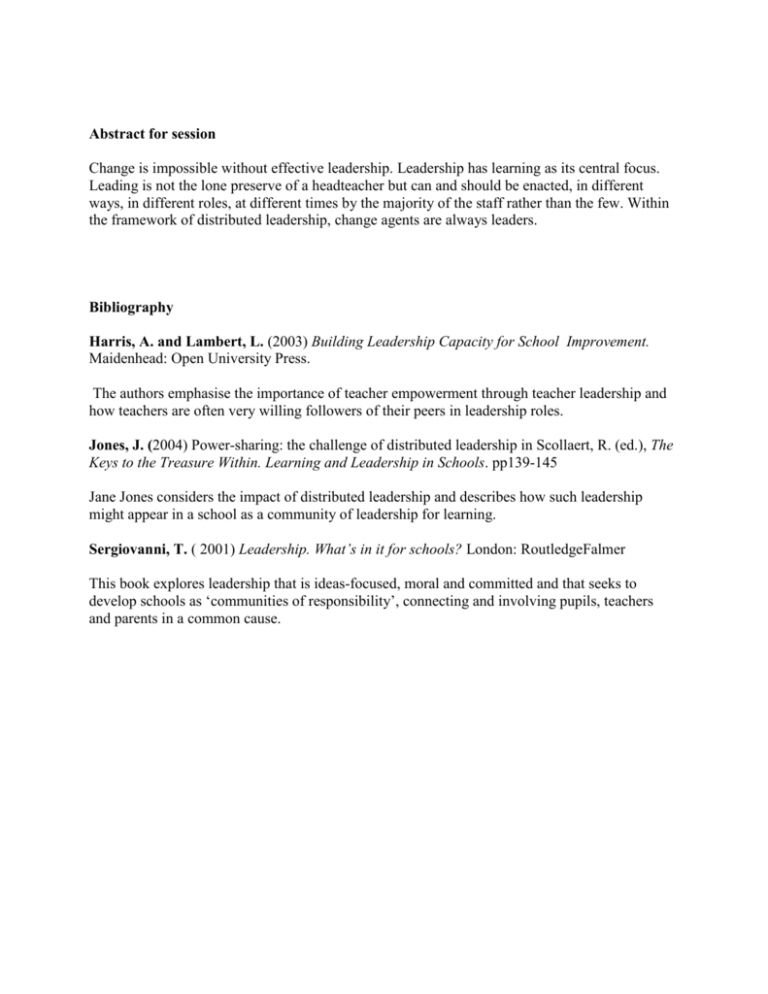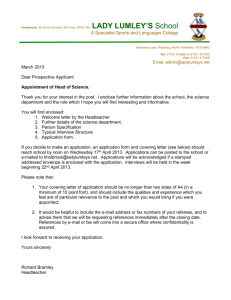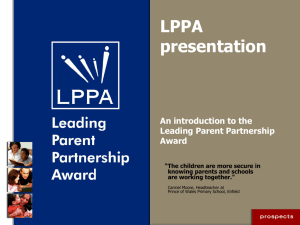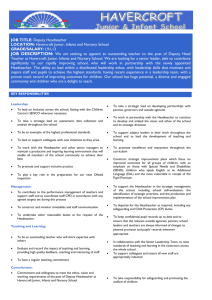Multiple Prague Jane
advertisement

Abstract for session Change is impossible without effective leadership. Leadership has learning as its central focus. Leading is not the lone preserve of a headteacher but can and should be enacted, in different ways, in different roles, at different times by the majority of the staff rather than the few. Within the framework of distributed leadership, change agents are always leaders. Bibliography Harris, A. and Lambert, L. (2003) Building Leadership Capacity for School Improvement. Maidenhead: Open University Press. The authors emphasise the importance of teacher empowerment through teacher leadership and how teachers are often very willing followers of their peers in leadership roles. Jones, J. (2004) Power-sharing: the challenge of distributed leadership in Scollaert, R. (ed.), The Keys to the Treasure Within. Learning and Leadership in Schools. pp139-145 Jane Jones considers the impact of distributed leadership and describes how such leadership might appear in a school as a community of leadership for learning. Sergiovanni, T. ( 2001) Leadership. What’s in it for schools? London: RoutledgeFalmer This book explores leadership that is ideas-focused, moral and committed and that seeks to develop schools as ‘communities of responsibility’, connecting and involving pupils, teachers and parents in a common cause. Case study Scenario-leadership A school’s headteacher is retiring and the school wishes to appoint a new headteacher (in a country where schools have the autonomy to appoint their own staff on the basis of open competition). The school is in a pleasant rural area with 1000 mainly compliant pupils and 80 staff and has been ruled for 15 years by a despotic head, competent in paper work and administration, incompetent in people- skills and the day- to- day concerns of the classroom. As a result, teachers have been fearful to make suggestions and have become settled into routines. They have rarely been consulted but informed in a top-down way of any changes that were to be made. As the school is partially selective, pupils’ behaviour is good, extra-curricular achievements are excellent yet much teaching is unstimulating and exam results are only mediocre. Staff development comprises some opportunities for some staff to attend day courses and some ‘experts’ have been brought in occasionally but rarely considered by the teachers to have added value to teacher learning. There are few real opportunities for staff development, promotion or innovation. There is a need for a new headteacher to ignite debate, engender change and to develop a new culture of professional development and one that values its staff. The school also needs to engage with the local community. Questions for consideration: What are the school’s needs and its most urgent priorities? What qualities, skills, experiences and competences are we seeking in a new headteacher? Would our advert look like the one below? What would our expectations be for the school in its first year? Headteacher required for September at the BASICS PROJECT Secondary School We need someone: With successful leadership experience (not necessarily at headteacher level) To develop community links and school networks To tackle underachievement Who will promote a rich and enjoyable culture of learning and teaching and staff development With a practical vision We offer: Opportunities to develop the vision and for leadership training The support of the School Board Capable staff and agreeable pupils (but not without personal and social problems) Pleasant buildings and surroundings if some areas a little shabby Salary negotiable according to experience An interview, to suitably qualified applicants, comprising a presentation and questions form a panel, to be held on Monday 21 Feb 2005. Leadership portfolio reflections 1 Do you agree that the right person was appointed in the fishbowl activity? Why or why not? 2 In what ways are you an effective leader and how do you know? What feedback have you had that you are effective in your leadership role? 3 What leadership skills, qualities, competences could you improve and how can you plan to do this? 4 Give 2 concrete examples of ways you have enabled colleagues at whatever level to be leaders and thus change agents 5 With reference to your own case study, where is leadership happening in your institution and where does there need to be/could there be more leadership possibilities? 6 What I am going to look for/ask about regarding leadership on the school visits 7 What have I learnt about leadership? How did I learn? What was my contribution to learning in the session on leadership? 8 A leadership doodle:











